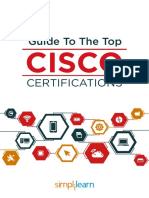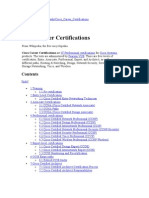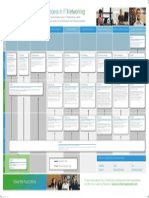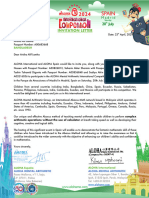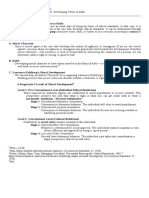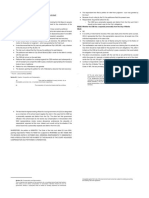Cisco Routing and Switching Certifications
Cisco Routing and Switching Certifications
Uploaded by
Bijay ShahCopyright:
Available Formats
Cisco Routing and Switching Certifications
Cisco Routing and Switching Certifications
Uploaded by
Bijay ShahOriginal Title
Copyright
Available Formats
Share this document
Did you find this document useful?
Is this content inappropriate?
Copyright:
Available Formats
Cisco Routing and Switching Certifications
Cisco Routing and Switching Certifications
Uploaded by
Bijay ShahCopyright:
Available Formats
Cisco Routing and Switching Certifications
Learning@Cisco Overview
Overview
Increasing Demand for Practical Network Skills As the network grows in complexity, so does the need for training for those who implement and manage network infrastructure and solutions. A skills gap emerges when technology outpaces professional skills development. To fill this talent gap, Cisco continues to develop training and certification products that help our customers be more successful using the network and the solutions that ride on top of the networksolutions like voice communications, video services and collaboration environments. To align with changing industry job roles, CCNA is being renamed CCNA Routing and Switching. Job-Ready Practical Skills The Cisco CCNA Routing and Switching, CCNP, and CCIE Routing and switching certification programs are practical, relevant, and job-ready certification curricula aligned closely with the specific tasks expected of these indemand professionals. Cisco realizes that the network professional increasingly must focus on design, configuration, and support responsibilities as the technical consultant, specialist or expert on a networking team. Therefore, the Cisco curriculum is specific to the best practices of network administrators, engineers, and experts using the latest Cisco network solutions. To fill this talent gap, Cisco continues to develop training and certification products that help our customers be more successful using the network and the solutions that ride on top of the networksolutions like voice communications, video services and collaboration environments. Best Practices in Networking Achieving CCNA (Cisco Certified Network Associate) Routing and Switching certification (formerly known as CCNA) is the first step in helping you prepare for a career in networking. Pursuing this certification will help improve your skill sets, and provide you with ability to manage and optimize network systems. CCNA Routing and Switching focuses on network infrastructure, mainly routing and switching, but it also includes wireless access, security, and connectivity to branch offices using WAN.
Achieving CCNA Routing and Switching Certification
CCNA Routing and Switching certification offers professionals job-ready training and skills. The certification lays the foundation for job roles such as network administrator, network engineer or network specialist. Candidates gain knowhow installing, monitoring and troubleshooting network infrastructure. The curriculum includes Cisco switches, routers, basic mitigation of security threats, introduction to wireless networking concepts and terminology, and performancebased skills. The curriculum also covers the use of the
1 2013 Cisco and/or its affiliates. All rights reserved.
Cisco Routing and Switching Certifications
following protocols: IP, Enhanced Interior Gateway Routing Protocol (EIGRP), Serial Line Interface Protocol, Frame Relay, VLANs, OSPF, Ethernet and Access Control Lists (ACLs). The curriculum also includes managing Cisco devices with IOS v15, Cisco licensing and extensive troubleshooting. Requirements for CCNA Routing and Switching Certification The CCNA Routing and Switching program is a three-year certification program intended to provide fundamental education and testing for network professionals interested in network infrastructure. You can recertify by taking any associate level exam or professional level exam or higher. Or you can also pass the CCIE certification exam before your certification expires. Prerequisites for CCNA Routing and Switching Certification There is no pre-requisite for attempting CCNA Routing and Switching Certification. This is a three-year certification program.
Learning@Cisco Overview
Requirements for CCNP Certification The CCNP program is a three-year certification program intended to distinguish the network engineers who have the ability to plan, implement, verify and troubleshoot local and wide-area enterprise networks and work collaboratively with specialists on advanced security, voice, wireless and video solutions. Before attempting the CCNP certification, individuals must meet the requirements for the Cisco CCNA certification and have at least one to three years of networking experience. Prerequisites for CCNP Certification A valid CCNA certification or any CCIE Certification can act as a prerequisite.
Required Exams and Recommended Training for CCNP
Completion of the CCNP curriculum requires the candidates to pass required exams. CCNP required exams and recommended training are shown in Table 2. Table 2: CCNP Exams and Recommended Training
Required Exams 642-902 ROUTE 642-813 SWITCH Recommended Training Implementing Cisco IP Routing (ROUTE) Implementing Cisco IP Switched Networks (SWITCH) Troubleshooting and Maintaining Cisco IP Networks (TSHOOT)
Required Exams and Recommended Training for CCNA Routing and Switching
Completion of the CCNA curriculum requires the candidates to pass Required Exams. CCNA required exams and recommended training are shown in Table 1. Table 1: CCNA Routing and Switching Required Exams and Recommended Training
Required Exams 640-802 CCNA OR 200-120 CCNA Recommended Training CCNA Composite v2.0
642-832 TSHOOT
OR 640-822 ICND1 OR 100-101 ICND1 AND 640-816 ICND2 OR 200-101 ICND2 Interconnecting Cisco Network Devices 1 (ICND1) v2.0 AND Interconnecting Cisco Network Devices 2 (ICND2) v2.0
Achieving CCIE Routing and Switching Certification
CCIE (Cisco Certified Internetwork Expert) Routing and Switching certifies the expert-level skills required to plan, prepare, operate, monitor and troubleshoot complex converged networks. Professionals who achieve CCIE have demonstrated their technical skills at the highest level. Candidates are expected to have an in-depth understanding of the topics on the blueprint and strongly encouraged to have at least three to five years of job experience before attempting certification. Requirements for CCIE Routing and Switching Certification The CCIE Routing and Switching program is intended to recognize the Cisco network experts who have the necessary skills to plan, test, deploy, configure, maintain, and troubleshoot Cisco network solutions. CCIE Routing and Switching certification is valid for two years and must be recertified every two years thereafter.
Achieving CCNP Certification
Those who achieve CCNP (Cisco Certified Network Professional) certification have demonstrated the skills required in enterprise roles such as network technician, support engineer, systems engineer or network engineer. CCNP certification offers employers proof of job-ready training and skills from experienced, professional-level network engineers.
2 2013 Cisco and/or its affiliates. All rights reserved.
Cisco Routing and Switching Certifications
To gain CCIE certification, candidates must not only prove their theoretical knowledge of best practices but also must demonstrate them in a lab environment using real-world scenarios. Prerequisites for CCIE Routing and Switching Certification There are no formal prerequisites for CCIE Routing and Switching certification.
Learning@Cisco Overview
Required Exams and Recommended Training for CCIE Routing and Switching
Candidates must first pass a written qualification exam and then pass the corresponding hands-on lab exam. Candidates are expected to have an in-depth understanding of the topics in the exam blueprints and are strongly encouraged to have three to five years of job experience before attempting certification. Completion of the CCIE Routing and Switching curriculum requires the candidates to pass required exams. CCIE required exams and recommended training are shown in Table 3.
Table 3: CCIE Routing and Switching Exams
Required Exams 350-001 Exam Name CCIE Routing & Switching v4.0 Written Exam CCIE Routing & Switching v4.0 Lab Exam
CCIE R&S Lab Exam v4.0
Learn More
For more information on these certifications, visit
http://www.ciscolearningnetwork.com.
Cisco and the Cisco logo are trademarks or registered trademarks of Cisco and/or its affiliates in the U.S. and other countries. To view a list of Cisco trademarks, go to this URL: http://www.cisco.com/go/trademarks. Third-party trademarks mentioned are the property of their respective owners. The use of the word partner does not imply a partnership relationship between Cisco and any other company. (1110R) 03/13
3 2013 Cisco and/or its affiliates. All rights reserved.
You might also like
- CCIE Service ProviderDocument1 pageCCIE Service ProviderwilliammikeNo ratings yet
- Rhetorical Analysis - She Used To Be MineDocument5 pagesRhetorical Analysis - She Used To Be Mineapi-550132675No ratings yet
- NR451 - PPT - Presentation Infection Control in Long Term CareDocument22 pagesNR451 - PPT - Presentation Infection Control in Long Term CareAndrea Tyler100% (1)
- Sextus Empiricus - Outlines of PyrrhonismDocument24 pagesSextus Empiricus - Outlines of Pyrrhonismagnostic_priest100% (1)
- Cisco Routing and Switching CertificationsDocument3 pagesCisco Routing and Switching CertificationscjtrybiecNo ratings yet
- Top CISCO Certification 1 2Document20 pagesTop CISCO Certification 1 2GyanNo ratings yet
- Ccent Icnd 1Document2 pagesCcent Icnd 1Dandy GonzálezNo ratings yet
- Cisco Certified Network AssociateDocument3 pagesCisco Certified Network AssociateAMINNo ratings yet
- Cisco Career CertificationsDocument18 pagesCisco Career Certificationsakbisoi73No ratings yet
- Career Certification Poster v3Document1 pageCareer Certification Poster v3Miguel Angel HernandezNo ratings yet
- Career Certification Poster v3Document1 pageCareer Certification Poster v3Miguel Angel HernandezNo ratings yet
- Best Wireless Networking Certifications To Enhance Your CareerDocument7 pagesBest Wireless Networking Certifications To Enhance Your CareerskilltechlabsofficialNo ratings yet
- Ciscofinalpresentation 091124002946 Phpapp01Document18 pagesCiscofinalpresentation 091124002946 Phpapp01Hemant MohiteNo ratings yet
- Ciscofinalpresentation 091124002946 Phpapp01Document18 pagesCiscofinalpresentation 091124002946 Phpapp01Hemant MohiteNo ratings yet
- Certification Poster DetailDocument1 pageCertification Poster Detailshan_jayNo ratings yet
- New-An+Ultimate+Guide+on+Cisco+CCNA+Certification CompressedDocument17 pagesNew-An+Ultimate+Guide+on+Cisco+CCNA+Certification CompressedrahulpanNo ratings yet
- Sec OView DSheetDocument3 pagesSec OView DSheetRoger JeríNo ratings yet
- Cisco Certification SurveyDocument5 pagesCisco Certification Surveymichael_mccabe_18No ratings yet
- Ccie Routing & Switching Version 5 (Brkccie-9162)Document112 pagesCcie Routing & Switching Version 5 (Brkccie-9162)dimkatsar30No ratings yet
- Voice and Collaboration Certifications: Learning@CiscoDocument4 pagesVoice and Collaboration Certifications: Learning@CiscoSalin SubranNo ratings yet
- CCNP Service Provider: What Is It?Document1 pageCCNP Service Provider: What Is It?taha aliNo ratings yet
- CareerCertification Poster v2Document1 pageCareerCertification Poster v2neubatenNo ratings yet
- Ccie SPDocument70 pagesCcie SPHenry Wong0% (1)
- CCIE SP Certification OverviewDocument3 pagesCCIE SP Certification OverviewShadowOfAngeloNo ratings yet
- CareerCertification PosterDocument1 pageCareerCertification Posterasdf9099No ratings yet
- Career Certification PosterDocument1 pageCareer Certification PosterErickNo ratings yet
- CareerCertification Poster v2Document1 pageCareerCertification Poster v2puma384No ratings yet
- Cisco Routing and Switching Certification Program: How You BenefitDocument3 pagesCisco Routing and Switching Certification Program: How You BenefitTRU CONVEYOR SYSTEMS DRC SARLNo ratings yet
- Cisco Routing and Switching Certification Program: How You BenefitDocument3 pagesCisco Routing and Switching Certification Program: How You BenefitKuldeep SinghNo ratings yet
- Cisco Career Certification PosterDocument1 pageCisco Career Certification PosterilundainNo ratings yet
- CareerCertification PosterDocument1 pageCareerCertification PosterRad IatorNo ratings yet
- CiscoCareerCertPaths PosterFinalDocument1 pageCiscoCareerCertPaths PosterFinalhobserNo ratings yet
- CiscoCareerCertPaths PosterFinalDocument1 pageCiscoCareerCertPaths PosterFinalFlorea Dan MihaiNo ratings yet
- CCNA R&S Course OverviewDocument13 pagesCCNA R&S Course Overviewjamashine147No ratings yet
- 13CS3962 CareerCertPaths Poster FINALDocument1 page13CS3962 CareerCertPaths Poster FINALamit_iihtdhn280No ratings yet
- CareerCertification Poster v2Document1 pageCareerCertification Poster v2leo_dhNo ratings yet
- 1.1.1 Routing and Switching Pro OverviewDocument2 pages1.1.1 Routing and Switching Pro OverviewrembrandtshiloahNo ratings yet
- Cisco Career Certification PosterDocument1 pageCisco Career Certification PostersomeoneniceNo ratings yet
- Cisco CCNA Write UpDocument3 pagesCisco CCNA Write UpTobi DavidNo ratings yet
- CCNA 640-801 Exam Tips and Preparation: MastercomputersDocument10 pagesCCNA 640-801 Exam Tips and Preparation: MastercomputersgpsmlkNo ratings yet
- CCNA Syllabus: CCNA® Routing & Switching CertificationDocument3 pagesCCNA Syllabus: CCNA® Routing & Switching CertificationabhilashkrishnNo ratings yet
- CCNA DatasheetDocument1 pageCCNA DatasheetMuhammad AlimNo ratings yet
- Professional Courses For NetworkingDocument2 pagesProfessional Courses For NetworkingJntech NetworksNo ratings yet
- Cisco Ccna Certification GuideDocument14 pagesCisco Ccna Certification GuideLuis CruzNo ratings yet
- Cisco 2020 Certifications Fa QDocument6 pagesCisco 2020 Certifications Fa Qnebondza100% (1)
- 200-301 CCNA Old and New CCNA ComparisonDocument5 pages200-301 CCNA Old and New CCNA ComparisonmihirmmbNo ratings yet
- Cisco Security Overview 16feb2012Document5 pagesCisco Security Overview 16feb2012Durán JoseNo ratings yet
- Netmetric Infosolutions PVT LTD: Course CatalogDocument4 pagesNetmetric Infosolutions PVT LTD: Course CatalogDhananjai SinghNo ratings yet
- CCNADocument7 pagesCCNAsmehranm.t1382No ratings yet
- Cisco Certifications PDFDocument10 pagesCisco Certifications PDFJuan NateNo ratings yet
- CCNA - Simple and Effective Strategies For Mastering CCNADocument107 pagesCCNA - Simple and Effective Strategies For Mastering CCNASupervision TelecomunicacionesNo ratings yet
- Top Benefits of Getting Your CCNA Certification in 2024Document7 pagesTop Benefits of Getting Your CCNA Certification in 2024lsaluja000No ratings yet
- Implementing Cisco IP Routing Learning GuideDocument24 pagesImplementing Cisco IP Routing Learning GuideEmmalee22No ratings yet
- This Article Relies On References To Primary SourcesDocument2 pagesThis Article Relies On References To Primary SourcesBoktiar HossainNo ratings yet
- CCNADocument6 pagesCCNAmaheshbabuhereNo ratings yet
- CISCO PresentationDocument12 pagesCISCO PresentationNajib NaamsNo ratings yet
- Faqs of Training CertificationDocument16 pagesFaqs of Training CertificationPierre Richard Pepe PosyNo ratings yet
- CCNA - WikipediaDocument3 pagesCCNA - WikipediaEdson AraujoNo ratings yet
- Pass4sure 300-115 DumpsDocument24 pagesPass4sure 300-115 Dumpspass4sureexam100% (2)
- CCNAcne 7834 FN 78 NR 43 FDocument2 pagesCCNAcne 7834 FN 78 NR 43 FMohamed OsamaNo ratings yet
- Cisco Certified Network Professional (CCNP) and ENCOR (350-401) Exam: Comprehensive Guide to Core Network Technologies, Security, Automation, and TroubleshootingFrom EverandCisco Certified Network Professional (CCNP) and ENCOR (350-401) Exam: Comprehensive Guide to Core Network Technologies, Security, Automation, and TroubleshootingNo ratings yet
- The CompTIA Network+ & Security+ Certification: 2 in 1 Book- Simplified Study Guide Eighth Edition (Exam N10-008) | The Complete Exam Prep with Practice Tests and Insider Tips & Tricks | Achieve a 98% Pass Rate on Your First Attempt!From EverandThe CompTIA Network+ & Security+ Certification: 2 in 1 Book- Simplified Study Guide Eighth Edition (Exam N10-008) | The Complete Exam Prep with Practice Tests and Insider Tips & Tricks | Achieve a 98% Pass Rate on Your First Attempt!No ratings yet
- The Complete Guide to Getting Certified Cisco CCNA 200-301: Complete Your CCNA Exam Training and Preparation with 400 Exam Level Practice QuestionFrom EverandThe Complete Guide to Getting Certified Cisco CCNA 200-301: Complete Your CCNA Exam Training and Preparation with 400 Exam Level Practice QuestionNo ratings yet
- Obe Syllabus in ChemistryDocument10 pagesObe Syllabus in ChemistryAmel MagallanesNo ratings yet
- Arisha Alif LamhaDocument1 pageArisha Alif LamhaFactory of IntelligenceNo ratings yet
- Cisco Mds Fibre Channel Blade Switch For Ibm Bladecenter and HP C-Class BladesystemDocument9 pagesCisco Mds Fibre Channel Blade Switch For Ibm Bladecenter and HP C-Class BladesystemRenu MahorNo ratings yet
- Administrative Disciplinary Cases (Deped) A. Filing of The Complaint/ Motu PropioDocument2 pagesAdministrative Disciplinary Cases (Deped) A. Filing of The Complaint/ Motu PropioAnthony YapNo ratings yet
- EC Information Board-FormDocument1 pageEC Information Board-FormSARAH MAE MARAVILLANo ratings yet
- Melo v. PeopleDocument1 pageMelo v. PeopleJoycee ArmilloNo ratings yet
- Events and SignalsDocument17 pagesEvents and SignalsvijiNo ratings yet
- ENGLISH4 - LAS Q4 Week2Document9 pagesENGLISH4 - LAS Q4 Week2socpen.aranasNo ratings yet
- M.tech Sem 1-Mid-1 Question PapersDocument3 pagesM.tech Sem 1-Mid-1 Question Paperspathanshamsheerkhan100% (1)
- Moral Agent - Developing Virtue As HabitDocument2 pagesMoral Agent - Developing Virtue As HabitCesar Jr Ornedo OrillaNo ratings yet
- Hans Eysenck's Biologically Based Factor TheoryDocument17 pagesHans Eysenck's Biologically Based Factor TheoryJoanna Marie SillanoNo ratings yet
- ArtDocument30 pagesArtSarah Billorente Basubas100% (1)
- My Project SlidesDocument23 pagesMy Project SlidesAnonymous XrXVPTrNo ratings yet
- Invented Basketball RW PagesDocument11 pagesInvented Basketball RW Pagesapi-31479116No ratings yet
- Places To Visit in IndiaDocument6 pagesPlaces To Visit in Indiamayuri26mauryaNo ratings yet
- BPG ReflectionDocument4 pagesBPG Reflectionapi-688564858No ratings yet
- ResumeDocument3 pagesResumemalli1616100% (1)
- SPJ English Essential-Learning-CompetenciesDocument13 pagesSPJ English Essential-Learning-Competenciessaiba_chic100% (5)
- An Investigation of Sustainable Maintenance Performance Indicators Identification Expert Validation and Portfolio of Future ResearchDocument18 pagesAn Investigation of Sustainable Maintenance Performance Indicators Identification Expert Validation and Portfolio of Future ResearchMelinda IbrahimNo ratings yet
- Thesis Proposal On Customer ServiceDocument6 pagesThesis Proposal On Customer Servicestacyjohnsonreno100% (2)
- Le Forme Des Adjectifs de Decription: Ending in - eDocument4 pagesLe Forme Des Adjectifs de Decription: Ending in - eDiether ManaloNo ratings yet
- F MyDocument20 pagesF Myjoao.matheus.torres.soutoNo ratings yet
- Gned 01-Art Appreciation: Kenneth Paul C. MojicaDocument37 pagesGned 01-Art Appreciation: Kenneth Paul C. MojicaAki CreusNo ratings yet
- DLL-21ST 2ND WeekDocument5 pagesDLL-21ST 2ND WeekrubielNo ratings yet
- Meeting Five: Tell Me About Your FamilyDocument12 pagesMeeting Five: Tell Me About Your FamilyD V YNo ratings yet
- Bailbond GuideDocument5 pagesBailbond GuidePatrick ManaloNo ratings yet
- Yujuico vs. AtienzaDocument2 pagesYujuico vs. AtienzaRenzoSantosNo ratings yet





